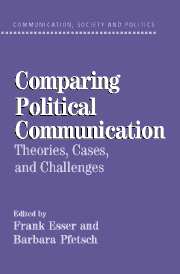Book contents
- Frontmatter
- Contents
- Contributors
- Comparing Political Communication
- INTRODUCTION
- I THEORIES AND METHODS
- II CASES
- III PERSPECTIVES AND CHALLENGES
- 14 State of the Art of Comparative Political Communication Research: Poised for Maturity?
- 15 From Political Culture to Political Communications Culture: A Theoretical Approach to Comparative Analysis
- 16 Problems of Comparative Political Communication Research: Culture as a Key Variable
- 17 Meeting the Challenges of Global Communication and Political Integration: The Significance of Comparative Research in a Changing World
- Author Index
- Subject Index
- References
16 - Problems of Comparative Political Communication Research: Culture as a Key Variable
Published online by Cambridge University Press: 24 November 2009
- Frontmatter
- Contents
- Contributors
- Comparing Political Communication
- INTRODUCTION
- I THEORIES AND METHODS
- II CASES
- III PERSPECTIVES AND CHALLENGES
- 14 State of the Art of Comparative Political Communication Research: Poised for Maturity?
- 15 From Political Culture to Political Communications Culture: A Theoretical Approach to Comparative Analysis
- 16 Problems of Comparative Political Communication Research: Culture as a Key Variable
- 17 Meeting the Challenges of Global Communication and Political Integration: The Significance of Comparative Research in a Changing World
- Author Index
- Subject Index
- References
Summary
Wilbur Schramm, one of the true founding fathers of communication science in the United States, once described the field as “an academic crossroad where many have passed but few have tarried.” Later Berger and Chaffee (1987, 15) noted that the crossroad had developed into a large urban center, complete with academic departments, research traditions, and journals. By those criteria, they decided that communications qualified as an academic discipline. An updated metaphor for the beginning of the new century might be a busy international airport, with the mixture of cultures and languages, shopping malls, and frenzied activity that one finds in almost every international airport in the world.
If anything, the field is more successful than ever. In the United States, there are departments of communication, schools of communication, and even colleges of communication with specialized communications departments within them. Total enrollment in journalism and mass communication programs alone – by no means the entire field – is more than 100,000. In most other countries, communication has also established a beachhead in traditional universities. In some – Germany and Britain come to mind – there is almost the same confusion of organization and definition even as universities create their own versions of suburban shopping centers. International conferences bring together specialists in animal behavior, hearing problems, cognitive science, journalism, cultural studies, new technologies, public policy, artificial intelligence, and post-Marxist ideology. By any reasonable criteria, communication is riding the crest of an expansive wave in almost all parts of the world.
- Type
- Chapter
- Information
- Comparing Political CommunicationTheories, Cases, and Challenges, pp. 367 - 383Publisher: Cambridge University PressPrint publication year: 2004
References
- 2
- Cited by

